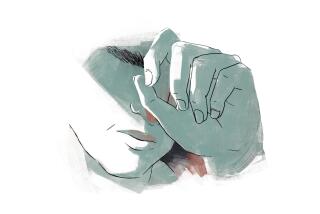When Suicide Becomes a Side Effect
- Share via
He was sick, they say. Something made him snap. He may have been HIV-positive. He was distraught, suicidal. He parked his truck on an L.A. freeway overpass. There was a fire, from which he narrowly escaped. Then he looked ready to jump to his death. In the end--in pain, in public--he used a gun.
Human beings die in horrifying new ways every day. Some suffer from illness. Some suffer from madness. A bad day may bring them to a point of no return. They go to a doctor in Michigan, one who specializes in assisted suicide. Or they go to Oregon, where suicide is still a sin, but isn’t necessarily a crime.
Otherwise, they hang on. They wait. They hope.
AIDS brought millions to the brink. When it was new, when it was unknown, that was the most frightening time of all. Nobody knew what caused it or what cured it. Many didn’t even know they had it.
You wondered what you would do. What if a doctor told you of a mysterious new virus, deadly as could be? That there was no known treatment? That you had it?
The new Newsweek has an article on hepatitis C. It is a virus. It is a killer. An estimated 4 million Americans already have it. Most don’t know it.
HCV can linger inside your blood system for years. You could have contracted it 20 or more years ago, from a transfusion or from casual drug use, just like AIDS. You can get it from a tattoo needle. You can get it from having your ears pierced.
Nobody even identified hepatitis C until 1989. More than 75% of those who have it will carry it for life. Thousands will require liver transplants. At least 10,000 Americans will die from hepatitis C this year alone. There is no proven vaccine.
Just what the world didn’t need.
Another plague.
*
At her home in Westchester, where she runs her own accounting service, Andrea Donovan, 51, was working in her pajamas Thursday, trying to get some payroll taxes done. She didn’t watch the L.A. freeway suicide, shutting off the TV. She had enough to think about without that.
The drug she takes for hepatitis C is called alpha interferon.
“Suicide is one of the side effects,” she says bluntly.
The psychological fallout of the treatment can be as devastating as the virus. Aside from the chronic fatigue, soreness and flu-like symptoms, there is stress. Donovan’s temperament was visibly affected. Clients found her losing her temper with increasing frequency. Many took their business elsewhere.
HCV came out of nowhere to take over her life. It can be so slow-acting, so undetectable, Donovan says, “You know what they call it? They call it the stealth killer.”
She knows she’s far from alone in having it. She mentions Naomi Judd, for one, as well as another popular singer who recently needed a liver transplant.
David Satcher, the surgeon general, calls hepatitis C a “major public health crisis.”
Donovan doesn’t know where or how she got it.
“I worked for a doctor in the mid-’80s,” she says. “I handled blood there. Once, I remember spinning blood in a centrifuge and the stopper came out. There was blood everywhere. If I had a cut on my hand, or an open sore. . . .”
A friend of Donovan’s daughter also has HCV. She once belonged to a group of young women who frequently walked barefoot. They would wipe each other’s feet with the same towel. Perhaps someone’s infected blood spread. From what Donovan knows of the virus, it can be that contagious.
“This thing’s 400% worse than AIDS,” she says.
*
We see a man on a freeway, then wonder what drove him to it. There is little to do but speculate whether a deadly virus could have led to such despair.
A hepatitis C foundation in Warminster, Pa., claims that HCV cases now outnumber HIV cases in the United States by nearly four to one.
In the San Antonio area alone, 200 drug users were tested for both HIV and HCV by a university’s health program. The HIV results were negligible; 91% tested positive for hepatitis C.
We know how to tell people to see doctors, have blood tests, take care, day after day. That’s easy.
Telling some people how to get through these days, that’s getting harder all the time.






